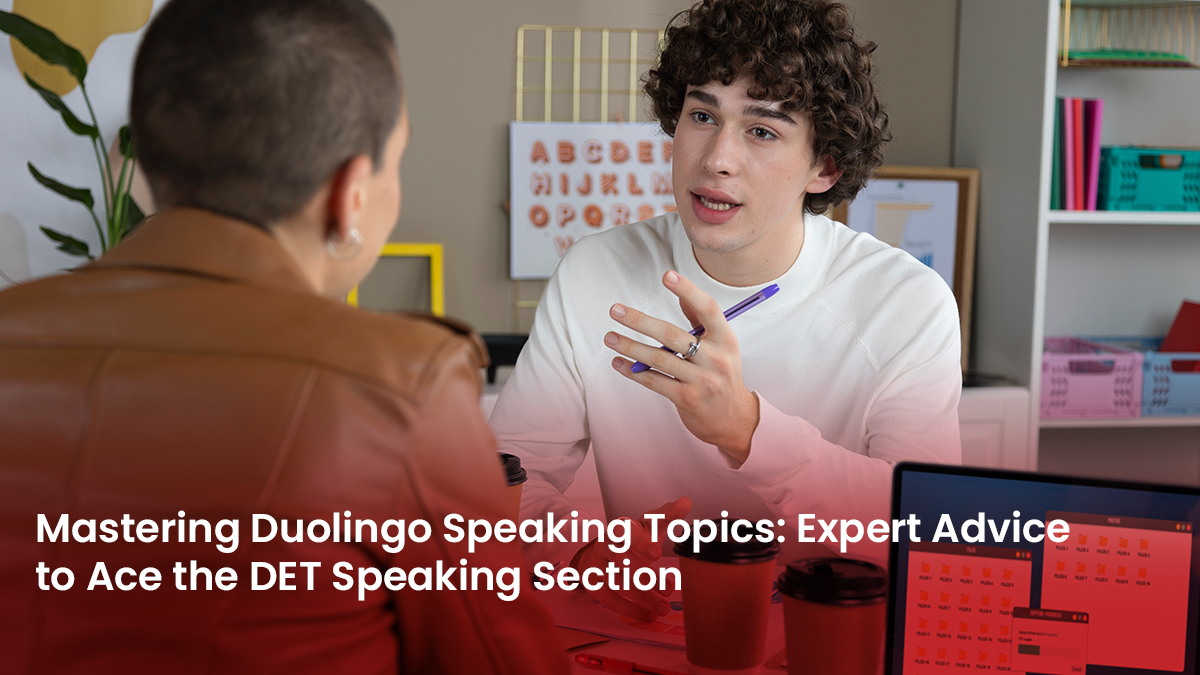The Duolingo English Test (DET) has emerged as a preferred assessment for individuals aiming to demonstrate their English proficiency for academic and professional endeavors.
A critical component of this test is the speaking section, which evaluates a candidate’s ability to communicate effectively in English.
This comprehensive blog by MSM Unify delves into Duolingo speaking topics, providing insights, sample questions, and strategies to help you excel in this segment. So, dive in!
Understanding the Duolingo English Test speaking section
The DET speaking section comprises various tasks designed to assess different facets of spoken English. These tasks include:
-
Speak about the photo
You will receive a question and a photo for 20 seconds. Common topics include animals, nature, buildings, people, and situations.
-
Read then speak
In this section, candidates receive a prompt to read and answer, with 20 seconds to prepare. This section is similar to the IELTS Cue Card.
-
Listen then speak
In this section, candidates listen to a prompt and answer the question. So, listening carefully is key to cracking this section!
Each task evaluates aspects such as pronunciation, fluency, coherence, and grammatical accuracy. Understanding the format and expectations of these tasks is crucial for effective preparation.
Common Duolingo speaking topics
Familiarity with recurring speaking topics can significantly enhance your performance. The DET often includes prompts related to:
- Personal experiences: Discussing hobbies, memorable events, or challenges overcome
- Education: Sharing insights about favorite subjects, educational experiences, or future learning goals
- Technology: Exploring opinions on technological advancements and their societal impact
- Travel: Describing past trips, dream destinations, or cultural experiences
- Family and friends: Talking about relationships, family traditions, or qualities of a good friend
By practicing responses to these topics, you can develop structured answers and build confidence.
Sample questions and responses
To aid your preparation, here are some sample questions along with suggested response structures:
1. Personal experience
Question: Describe a skill you’ve recently learned.
Response structure:
- Introduction: Introduce the skill
- Learning process: Detail how you acquired it
- Challenges and overcoming them: Discuss any difficulties faced and solutions implemented
- Current application: Explain how you use the skill now.
2. Education
Question: What was your favorite subject in school and why?
Response structure:
- Subject introduction: State the subject
- Reasons for preference: Elaborate on why it appealed to you
- Impact: Describe how it influenced your academic or career choices
3. Technology
Question: Discuss the impact of social media on communication.
Response structure:
- Overview: Briefly define social media
- Positive impacts: Highlight benefits such as connectivity and information sharing
- Negative impacts: Address issues like misinformation or reduced face-to-face interactions
- Personal stance: Conclude with your perspective on balancing usage
Strategies for effective responses
To excel in the DET speaking section, consider the following strategies as suggested by expert MSM Unify overseas education consultants.
-
Organize your thoughts
Use the preparation time to outline your response mentally. Organizing thoughts will help you speak coherently and confidently.
-
Practice regularly
Engage in speaking exercises regularly to build fluency and confidence. You may also practice with a friend or seek an expert’s help to practice efficiently.
-
Seek feedback
Seek help from MSM Unify study abroad consultants to receive constructive feedback. This will help you overcome your challenges and master your strengths better.
-
Record and review
Record and listen to your own responses to identify areas for improvement. Listen to your old records as well to assess how far you have come and what kind of improvement is needed.
-
Expand vocabulary
Incorporate varied and appropriate vocabulary to articulate ideas effectively. However, ensure that you do not make mistakes and use fancy words in the incorrect context just to flaunt your vocabulary; this might misfire badly!
How to prepare for Duolingo English Test
Sample speaking topics table (2025 updated)
Below is a quick-reference table featuring some of the most asked speaking prompts you can expect in 2025:
| Topic category | Sample question | Handy tips to answer effectively |
| Personal experience | Describe a time you helped someone | Use past tense, provide context, and show empathy |
| Technology | Do you think AI is good or bad for society | Provide pros and cons, conclude with personal view |
| Travel | Talk about a memorable trip and why you enjoyed it | Describe the location, activities, and emotions involved |
| Education | What do you think about online education | Mention benefits, limitations, and a final stance |
| Daily routine | Describe your typical weekday | Use time-based sequencing (First, then, next, etc.) |
| Hobbies and interests | What do you like doing in your free time | Be descriptive and link it to personal development |
| Future aspirations | What are your goals for the next five years | Be clear and structured, and show ambition |
Practicing these Duolingo speaking topics not only boosts confidence but also prepares you to think and respond in a structured, time-bound manner.
Utilizing resources for preparation
Leveraging quality resources can enhance your preparation. So, here’s what you need to do to ensure an all-around preparation:
- Practice platforms: Various credible websites offer mock tests and sample questions
- Educational blogs: Articles from MSM Unify and other credible platforms provide insights and sample answers
- Consultation services: Engage with MSM Unify overseas education consultants for personalized guidance and strategies
Duolingo Certificate: A Complete Guide
How MSM Unify overseas education consultants can help
Navigating global education tests like the Duolingo English Test requires more than just practicing; it demands strategy. That’s where MSM Unify overseas education consultants come in.
With years of experience and a deep understanding of language testing frameworks, MSM Unify helps students:
- Build personalized speaking practice schedules
- Analyze their strengths and weaknesses
- Get expert feedback on pronunciation and fluency
- Learn effective test-taking strategies
- Prepare not just for speaking but for the entire DET
Whether you are just starting with the Duolingo English speaking course or aiming to polish your advanced skills, MSM Unify ensures you are test-ready.
Final expert tips for mastering Duolingo speaking topics
Here are the conclusive expert tips from MSM Unify overseas education consultants to help you sail through the preparation process and better your chances of excelling in the actual test.
- Practice real questions from reliable sources
- Simulate test conditions by timing your responses
- Use structured responses: intro – body – conclusion
- Record yourself, then self-assess or get feedback
- Explore varied speaking exercises Duolingo offers for daily practice
And finally, remember: no matter how much you prepare, test-day confidence comes from consistent, quality practice. Let MSM Unify overseas education consultants be your guide on your aspirational journey!
Conclusion
The Duolingo English speaking section is more than a language test; it’s a reflection of your ability to think, respond, and articulate under pressure. Mastering Duolingo speaking topics requires familiarity with common questions, practicing structured responses, and honing your English through focused exercises.
From the Duolingo English speaking course to expert-led preparation by MSM Unify overseas education consultants, the path to a high score is within reach—if you’re equipped with the right strategies and resources.
Don’t just prepare; prepare smart. Speak clearly, confidently, and with purpose. And when in doubt, remember that MSM Unify is just one step away to guide you through every word, sentence, and goal you set on your international education journey.



























